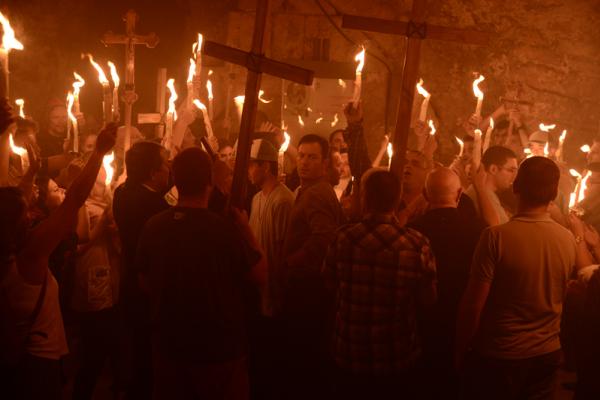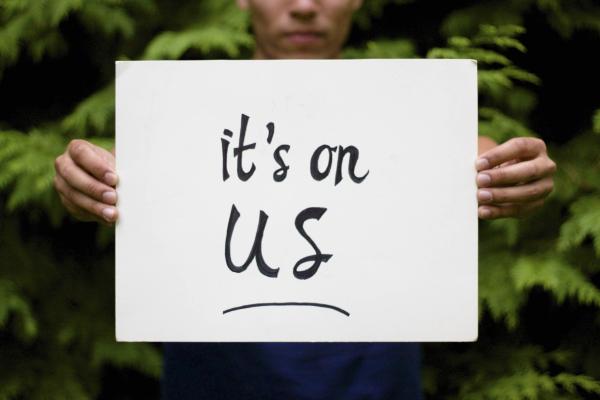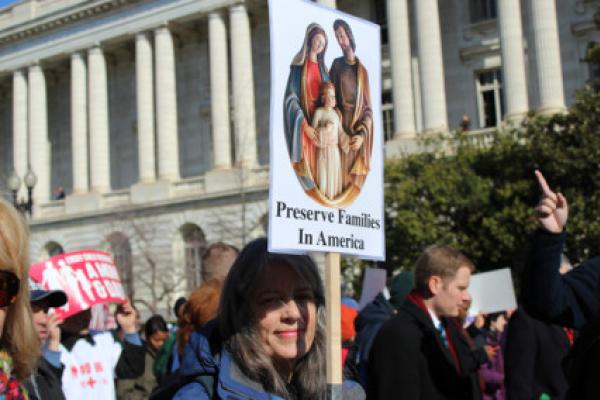1. An Open Letter to Franklin Graham
"Within one day, tens of thousands of [Graham’s] faithful followers liked and shared his short, patronizing post that called ‘Blacks, Whites, Latinos, and everybody else’ to ‘Listen up’ and tune in to his take on why so many black people have died at the hands of police officers recently. According to Graham, the problem is “simple.” It can be reduced to their lack of obedience and bad parenting. … Thankfully, we have a response: We invite you to join with us in signing on to an open letter to Rev. Graham calling him back to the Gospel's ministry of reconciliation. Sign on now."
2. PHOTOS: The First Day of Spring and a Total Lunar Eclipse
Space.com offers this gallery of images from this early morning’s lunar eclipse (not visible from the United States). In addition to coinciding with the vernal equinox — kicking off Spring, as snow fell across the Northeast — the eclipse also overlapped with the supermoon. ...And astronomers across the world geeked out.
3. Ashley Judd Pressing Charges Against Misogynist Internet Trolls
“Everyone needs to take personal responsibility for what they write, and [for] not allowing this misinterpretation and shaming culture on social media to persist,” Judd said. “And by the way, I’m pressing charges.”
4. This Is What Life in Syria Is Like After Four Years of War
According to the U.N., 200,000 people have been killed. More than half of the country’s 21 million residents have fled their homes. Life expectancy has fallen by 20 years. It has becomes the world’s deadliest country for reporters. BuzzFeed interviews three Syrians to get a feel for life in the war-torn country.
From The Atlantic: “Mennonites are wrestling with the same questions faced by other churches across the country, made all the more complicated by their heritage: How should the faithful balance tradition and modern life? How should scripture inform people's understandings of same-sex relationships? And when members of a denomination disagree, how should they find their way forward?”
6. Pentagon Loses Track of $500 Million in Weapons, Equipment Given to Yemen
“In recent weeks, members of Congress have held closed-door meetings with U.S. military officials to press for an accounting of the arms and equipment. Pentagon officials have said that they have little information to go on and that there is little they can do at this point to prevent the weapons and gear from falling into the wrong hands.”
7. You May Be a ‘Poser’ Christian and Not Even Know It
According to Jarrid Wilson, author of Jesus Swagger: Break Free from Poser Christianity, cosmetic Christianity is an epidemic. Jonathan Merritt interviews the author to find out more.
8. U.N. Workers Accused in Nearly 80 Cases of Sexual Assault in 2014
“United Nations personnel were accused in nearly 80 cases of rape, sexual assault and sex trafficking in 2014 alone, with the bulk of the cases involving peacekeepers deployed to some of the most troubled parts of the world.”
9. Where My Ladies At? Gender Avenger Tracks Inequality at SXSW and Beyond
Wondering whether your favorite conference or event has its equal share of men and women at the podium? There’s an app for that. The Gender Avenger Tally (soon available on mobile) lets people calculate via event hashtag the levels of gender representation.
10. Happy Spring! Read Walt Whitman’s ‘The First Dandelion’
Simple and fresh and fair from winter’s close emerging,
As if no artifice of fashion, business, politics, had ever been,
Forth from its sunny nook of shelter’d grass — innocent, golden, calm as the dawn,
The spring’s first dandelion shows its trustful face.
"Dig," the new action-thriller series from the USA Network, is starting to add up — at least in terms of its religious content.
The third episode, broadcast March 19, advanced plot lines involving an apocalyptic sect of Jews, a desert-dwelling Christian cult, a stolen Torah breastplate rumored to be a telephone to God and a really cute baby cow named "Red" who is having a less-than-excellent adventure.
Tossed like a ball of spices into that potboiler of a story is a difficult biblical text, a secretive society dedicated to restoring the Jewish temple on Jerusalem’s Temple Mount and what may be a nod to Jewish numerology.
"It’s all about XIX," or the number 19, FBI agent Peter Connelly (Jason Isaacs) reads in a journal swiped from a murdered archaeologist.
Here — with spoiler alerts — is what’s behind the newly introduced religious elements to the "Dig" storyline.
Numerology:
Ever notice how in the Bible there are always 12 of this (Tribes of Israel, disciples) and 40 of that (days of rain, years in the desert)? It’s never eight or 11 or — heaven forbid — 17?
That’s because ancient cultures, especially biblical-era Jews, practiced numerology — the belief that numbers have specific religious or spiritual significance. There is a whole branch of study in Judaism called "gematria" by which letters of the Hebrew alphabet are given numerical values and scholars add them up in a search for meaning. The creators of "Dig" seem to be aware of this and are having some fun.
Twice in episode three, the number of Peter Connelly’s hotel room — seven — is pointedly shown. In numerology, seven is considered a perfect number, a "divine" number, the number of God. It represents holiness and sanctification — two themes that pop up over and over again in the search for the "pure" red heifer and the apparent need to keep the boy Joshua’s feet "unsoiled."
And when Peter has a bad dream, his bedside clock reads 11 p.m. In the Bible, 11 represents chaos, disorder, even impurity.
Then there’s that pesky number 19, which is behind much of the episode’s action. In biblical numerology, one is considered the number of God and nine is the number of his judgment. That sounds ominous enough for a thriller-conspiracy-action series like "Dig."
Scottish Cardinal Keith O’Brien, who was accused of sexually harassing several men in a scandal that exploded on the eve of the 2013 conclave that elected Pope Francis, has renounced the “rights and privileges” of his office but may keep his prestigious title, the Vatican announced March 20.
O’Brien did not take part in the March 2013 conclave and now he will be barred from any future conclaves. At age 77, he would have lost his voting eligibility at age 80.
Francis had been under pressure to take some action against O’Brien since one of his victims revealed that an internal church report on O’Brien had been sent to Rome and was “hot enough to burn the varnish” off the pope’s desk.
At least five men — three priests, a former priest, and a former seminarian — accused O’Brien of either sexually harassing them or pressuring them into sex, in allegations that went back to the 1980s. O’Brien was accused of being sexually active up through at least 2009.
Those were also the years in which O’Brien became increasingly outspoken in his denunciation of homosexuality and gay rights; he called to homosexuality a “moral degradation” that was “demonstrably harmful” to gay people. In response, the gay rights group Stonewall crowned O’Brien “bigot of the year.”
When Pope Benedict XVI accepted O’Brien’s resignation as one of his last official acts before retiring, O’Brien admitted “there have been times that my sexual conduct has fallen below the standards expected of me as a priest, archbishop and cardinal.”
Adding to the urgency for Francis to take further action were recent reports that the Archdiocese of St. Andrews and Edinburgh, which O’Brien headed until he resigned in the wake of the initial revelations, had spent nearly $300,000 on a retirement home for O’Brien in northern England.
A valuable part of bystander intervention work in communities and schools, then, is helping men and boys understand how unhealthy social norms of masculinity can prevent them from intervening to stop sexual assault. Healthier forms of masculinity, however, can help boys and men become part of the solution by practicing prevention. As part of our Healthy Masculinity Action Project, we have developed some core values and actions to spread the message of healthy, nonviolent masculinity:
- recognizing unhealthy, risky, and violent masculine attitudes and behaviors that are harmful to the self and others
- replacing unhealthy masculine attitudes and behaviors with emotionally intelligent attitudes and behaviors that respect the self and others
- learning to empathize with the self and others
- supporting gender equity and other forms of equity
- learning and using emotional and social skills to constructively challenge unhealthy masculine attitudes and behaviors expressed by others
At MCSR, we don’t believe that men are naturally or biologically violent, or that somehow the need to kill, maim, rape, and more generally dominate is written into the language of our genes. If no genetic code binds us to violence, if no destiny of murder and mayhem irrefutably awaits us, we can choose to intervene when faced with unhealthy, harmful masculine attitudes and behaviors. We can choose healthy masculinity and present it as choice for men and boys. It’s on us to do so.
When Pope Francis pays a visit to Naples March 21 he will have lunch with some 90 inmates at a local prison, a contingent that will reportedly include 10 from a section reserved for gay and transgendered prisoners, and those infected with the virus that causes AIDS.
The stopover at the Giuseppe Salvia Detention Center in Poggioreale, near Naples, was originally not scheduled to include lunch, according to a report from Tv2000, an Italian television network operated by the country’s Catholic bishops.
But the pope insisted on the meal, which will be prepared by the prisoners, some of whom will come from two other detention centers. The 90 were chosen by lottery from among 1,900 inmates, according to the Vatican Insider website .
Among the many innovations Francis has made since his election two years ago this month has been a new tone and approach to gay and transgender people.
Rabbi Ruth Bader Ginsburg?
Not quite, but when a Jewish nonprofit asked the Supreme Court justice to write a biblical commentary for Passover, she agreed, and added a feminist twist: It would raise up the often overlooked women of the Exodus story.
Ginsburg, one of three Jews and three women on the high court, is known as a champion of women’s rights — but not for being particularly religious.
But Rabbi Lauren Holtzblatt, whom Ginsburg asked to help out with the commentary, said Ginsburg had a clear vision for the piece and knew exactly which biblical women she wanted to highlight from the iconic liberation story of the Book of Exodus.
“She has a Jewish soul, there is no question,” Holtzblatt, a rabbi at Adas Israel, a Conservative synagogue in Washington, D.C., said of Ginsburg.
“It’s in her. It’s deeply in her.”
St. Mary’s Cathedral in San Francisco is getting bad press this week over a sprinkler system it installed to keep homeless people from sleeping on church grounds.
People are outraged that a church would treat the poor so callously. But St. Mary’s isn’t alone. Many houses of worship all over the country face the question of how to keep safe, welcoming grounds while being compassionate to homeless neighbors sleeping on porches and in doorways.
Here’s what we tried at Mount Vernon Place United Methodist Church in Washington, D.C.
A couple of months ago, we started a dialogue around how to move people off the porches of the church and assist them in moving on. Over the years, the protected and secluded porches had become sleeping quarters for a dozen or so folks, and it was now out of hand. People were using the grounds as bathroom facilities; others were leaving their belongings in plastic-covered 4-foot high mounds.
The conversation, held in a church committee meeting in January, was contentious.
Pardon the yawn.
The 1.8 million-member Presbyterian Church (USA) on March 17 voted to officially approve of same-sex marriage, an announcement that shouldn’t surprise anyone who has followed the mainline Protestant denomination’s trajectory. Perhaps a more substantial but less widely reported story was the decision by City Church, San Francisco’s largest evangelical congregation, to affirm LGBT couples.
Evangelicals are among the most stalwart opponents to LGBT marriage, but a number of evangelical congregations have publicly shifted their stance in the last year. Among them are Seattle’s Eastlake Community Church, Nashville’s GracePointe Church, Portland’s Christ Church, and New Heart Community Church in La Mirada, Calif. Other prominent evangelical pastors tell me off the record that they are in the midst of similar conversations.
Churches aren’t the only evangelical factions inching left on matters of sexuality.
In this Lent reflection, Grant and Uncle Graham Paulson talk about cultural genocide and forgiveness in the same breath. It is an honor to listen to someone who is possible of such a witness.
For the past 20 years or so, adoption has grown to become a staple of much of Christian culture in America. So much so that one could actually argue that adoption has become trendy within evangelical circles. As I’ve said before, if something were to become trendy, I’m glad that helping kids in need is one of them — though the trendiness of adoption has certainly led to some negative outcomes as well. While I won’t get into all of the aspects where adoption culture has gone wrong — that could take a series of posts — I do want to address what I feel is the most critical oversight we have made, and how we begin to fix it.
Orphan care is critical to the life of a Christian whether one is called to adopt (and trust me, not everyone is called to adopt — it’s not all rainbows and sunshine kisses). Caring for orphans is something we see consistently expressed in both the Old and New Testaments. In fact, James goes as far as saying that caring for widows and orphans is the only religion that God finds acceptable. While Christian culture for the past few decades has certainly taken that calling seriously, I think it is time for adoption culture to shift its focus in order to take the issue more seriously and to more effectively address the real issue at hand.
How did we miss the most important aspect of orphan care? This stems from a misunderstanding and misdiagnosis of the problem. Much of adoption culture has been led to believe that there is an orphan crisis in the world today with somewhere around 153 million children being orphaned. On the surface, this number of 153 million (provided by UNICEF) understandably leads one to believe that tonight there will be 153 million children who will go without the loving embrace of their parents. It’s a number so staggering that one can easily understand why culture mobilized and began adopting these children at rapid pace.







